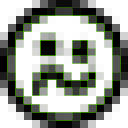> yes, probably. but now I'll try to run it on my Atari ST 
Seriously try it if you get time one day. Oddly the Atari ST is still *THE* choice for some serious techno musicians. Why? The simplicity of how the UART is addressed and clocked gives it rock solid midi timing. It's something that seems to elude complex architectures even with the best preemptive scheduling, buffering etc. I've watched top producers take a midi file on floppy disk from their $5000 super Mac/PC systems to have it play back on an Atari for final mixdown. It's one of those analog vs digital type debacles where real experience of good ears trumps what "technically shouldn't be so". The ST lacks enough grunt for useful audio DSP, but as a midi processing hub or sequencer it could be an astonishingly powerful tool with pd if you can compile it.
>mhh... this is just a anthropomorphic vision of reality...
You got me.
>what I need to ask now is where I can find reference for all objects:
>I know that there's no menu of them and i have to type their name in those little boxes, but
>I need to know, at least, what objects I can create, typing their names, is it true?
Yeah that bothers me too. Even after using for it some time I forget the name of an atom and have to go looking for it. I often do something like "ls /usr/lib/pd/externs/ | grep pd_linux$ | less" to see if I actually have something. For windows likewise search the externals directory for .dll files
>so, I would like to have a list with the object identifier (for oscs, filters etc.), their
>details (kind of filters, slopes, ripples etc. for filters, as example ), their parameters (cutoff, Q, etc.)
>is there a documentation like this?
The help files are detailed, well written and easy to use. Once you know that such an object exists. Just right click any atom and select "help". Usually there's an example case.
Check these to find common atoms
http://puredata.hurleur.com/sujet-248-suggestions-noobs
http://ccrma.stanford.edu/courses/154/pd-reference.html
http://pure-data.sourceforge.net/documentation.php
>I know... but I still feel more confortable with a traditional language (C++, pascal), also
>for writing my personal VSTs (you know, for those weirdest things...) I think it's still easier to write "algorithms" with a textual language,
>without a graphical metaphore.
Raw code is not an expedient or practical way to make music. Having used Music(N), Csound, Nyquist (LISP/SCHEME), and all that stuff I can say this from the bottom of my heart after 15 years experience. Pd gives you two really important things from a software engineering point of view. It's modularity and clarity of interface in abstracting things just beats any C++ classes hands down for it's intended purpose - digital signal dataflows. Consequently you get better decoupling and better reuse. One of the few pitfalls for a trad programmer imho is that pd is very dirty on types, in a way it's one of the most badly typed languages I've ever experienced. Ironic for a tool called "pure data", but you get used to it's lovable idiosynchrocies vis lists, messages, numbers, arrays, symbols and generic "anys". Also it's scoping rules leave a lot to be desired, everythings global within one instance of the server unless you say $0- at the head of a name.
>But now I need to teach a course on "languages for electronic music" in classical, academic shool.
>they don't know DSP matchematics or something like,
>so I need to urgently search for use a more "abstract" instrument for doing the lessons...
You couldn't wish for a more appropriate tool. For non maths/physics students you can use the power of abstraction to build "black boxes" like synths, analysis tools and sequencers and then open them up later in the course. As Claude says, it takes about 9 months or more before you really take to PureData. Electronic music is BIG, really big, not as big as space but it's a discipline that just explodes in scope once you get into it. You can waste weeks writing externals in C, or designing a synth, or creating a composition method...you can get really lost on a random walk in d>2. The best way forward is to have a context and a goal. Teaching this course sounds like an excellent vehicle to focus your scope.
>Tried also Jmax but on Windows (required OS, because > 95% students use billgatesware ) is quite unstable
I would make it "unrequired". Put your foot down as course leader/tutor that Windows is unsuitable. In order of preference I would go with Mac, then Linux, then Win. If the students only have Windows then try Dyne:bolic ( http://dynebolic.org/ ), a minimal GNU/Linux distro that runs from a CD in RAM and comes preconfigured with PureData and a smorgasboard of other digital media tools. That said, I've seen it work really well on Windows. Once. I've no hard evidence to back this up, but I feel a disturbance in the force when Pd runs on Windows, as if a million threads cried out at once and were suddenly silenced. I don't think it likes heavily loaded machines and I guess 99% certain the reason it's unstable on Win is down to *other* things running. Hint: a music machine shouldn't double as an email server and GCHQ spyware centre. Start with a clean install and nothing else running and you may have better luck, but that will probably remain stable about as long as a schizophrenic Z-boson particle if you network it.




